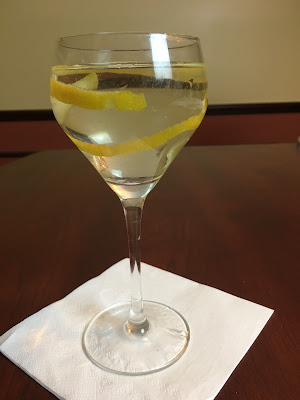The Vesper
Bond initially orders a “dry martini. One. In a deep champagne goblet.”
“Oui, monsieur,” replies the barman.
“Just a moment,” Bond says. “Three measures of Gordon’s [dry gin], one of vodka, half a measure of Kina Lillet. Shake it very well until it is ice-cold, then add a large thin slice of lemon peel. Got it?”
“Certainly, Monsieur.” Notes the narrator, Ian Fleming: “The barman seemed pleased with the idea.”
Personally, I would have thought the barman would be puzzled by the idea, for three reasons.
First, many mixologists maintain that shaking a Gin Martini “bruises” the juniper that constitutes the gin's most aromatic element. (Others pooh pooh this idea, but in the 1950s, when Ian Fleming wrote Casino Royale, it was the conventional wisdom. And even today, nearly all Gin Martini recipes specify that the drink should be stirred.
Second, shaking any cocktail with ice quickly dilutes the drink. It has been argued that Bond deliberately ordered his Martinis to be “shaken not stirred,” so that they would appear stronger than they were, but in _Casino Royale_, Bond is emphatic that he likes his cocktails “very strong” (as well as “very large and very cold and very well made").
But third, whatever Bond might be describing, it isn’t a Dry Martini. Let’s leave aside the vodka, which has no place in a Gin Martini but, given that it’s odorless and tasteless, isn’t going to change the flavor profile (although Bond advises the barman that vodka made with grain is superior to that made with potatoes). A Dry Martini has almost no dry vermouth—“2-3 dashes” is the amount Simonson calls for in his recipe, which involves 2 1/3 oz. dry gin. Other typical recipes are a bit more generous with the dry vermouth: 2.5 oz. dry gin, 0.5 oz. vermouth. The latter is a ratio of 5:1. Dry Martini fanatics tend to be more in line with Simonson.
Leaving aside the vodka, Bond’s ratio of gin to Kina Lillet is 6:1, which would be slightly more dry than the typical Martini recipe except that Kina Lillet is not at all dry. The name “Kina” was dropped in the 1970s, so nowadays it’s Lillet Blanc, which is supposed to be less sweet than Kina Lillet. However—and this is a big however—Lillet Blanc is still noticeably sweeter than sweet vermouth.
Thus, either Bond had no idea what he was talking about, or he changed his mind about a Dry Martini and went for the rough equivalent of a Medium Martini (equal parts gin, dry vermouth, and sweet vermouth). The Vesper is, as Simonson maintains, “a damn fine drink,” but whatever else it may be, it is not a Dry Martini.




Comments
Post a Comment